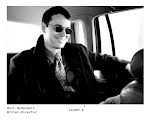• • •
The very early years of the 20th Century made
up one of Chicago's Golden Eras of Literature.
H. L. Mencken referred to Chicago as "... the
literary capital of America." Theodore Dreiser
published Sister Carrie in 1900 to kickoff the new
century and the new era. Upton Sinclair's explosive
novel, The Jungle, came out in 1906, and the Chicago
connection must not be forgotten when it comes to
Frank Baum whose Wizard of Oz was also published
in 1900. It was first sold at a book fair at Chicago's
famous Palmer House Hotel. Some writers still on the
near horizon to come were Sherwood Anderson,
Ring Lardner and Ben Hecht.
One name you would not find in such lists - and which
most certainly deserves a place in the Chicago canon of
great writers - is S. W. Erdnase. He is largely forgotten
outside of the magic world, because he wrote in a
disreputable genre, the how to cheat at cards genre - yes,
that one.
This may seem a little off-putting, and the technical
sections are not for everyone; but the introductory
material in which he talks about the methods and psychology
of gambling, in particular about advantage play, his term for
cheating, is fascinating for almost anyone, not just card players.
And he writes like a fallen angel:
We betray no confidences in publishing this book, having only ourselves to thank for what we know. Our tuition was received in the cold school of experience. We started in with the trusting nature of a fledgling, and a calm assurance born of overweening faith in our own potency. We bucked the tiger voluntarily, and censure no one for the inevitable result. A self-satisfied unlicked cub with a fairly fat bank roll was too good a thing to be passed up. We naturally began to imbibe wisdom in copious draughts at the customary sucker rates, but the jars to our pocketbook caused far less anguish than the heartrending jolts to our insufferable conceit. After the awakening our education progressed through close application and constant study of the game, and the sum of our present knowledge is proffered in this volume, for any purpose it may answer, to friend and foe, to the wise and the foolish, to the good and the bad, to all alike, with but one reservation, that he has the price.
Sounding like an excerpt from P. T. Barnum's memoirs as ghosted
by Walt Whitman, the writing is muscular and exuberant. Although
he writes of the "overweeening faith" in his own powers as a thing
of the past, the writing still brims with confidence. He comes across
as an only slightly chastened literary Hotspur, to whose words from
Henry IV Pt I, he seems to refer: "They wound my thoughts worse
than thy sword my flesh." Hotspur mourns the loss of his "proud
titles," but Erdnase's pride is intact, no matter the "jolts to [his]
insufferable conceit".
• • •
Wednesday, March 7, 2012
S. W. Erdnase & The Chicago Renaissance
Subscribe to:
Post Comments (Atom)

No comments:
Post a Comment